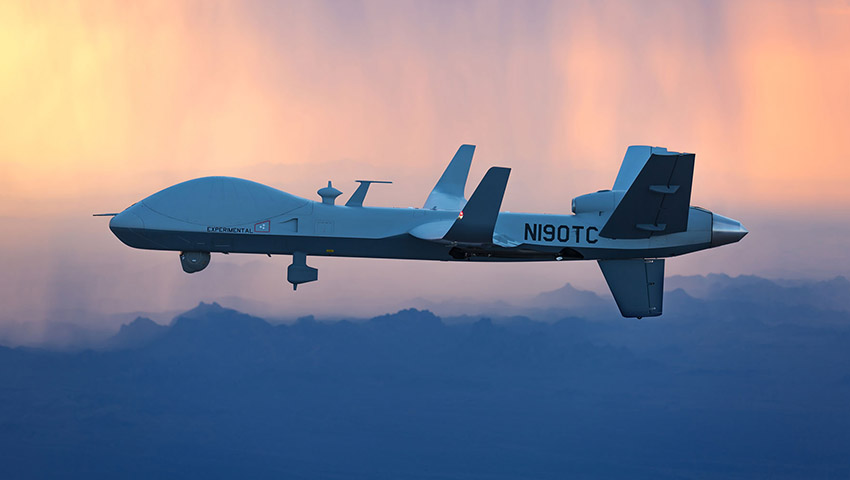The US State Department has sanctioned the Commonwealth government’s controversial order of the remotely piloted aircraft.
The Defense Security Cooperation Agency (DSCA) has approved Australia’s request to purchase up to 12 weapons-ready MQ-9B SkyGuardian/SeaGuardian aircraft for an estimated US$1.65 billion ($2.1 billion).
The deal also involves the provision of a range of other related equipment, including:
- 15 Raytheon Multi-Spectral Targeting Systems-D (MTS-D) EO/IR sensors;
- 16 Lynx AN/APY-8 Synthetic Aperture Radars (SAR) with Ground Moving Target Indicator (GTMI);
- 15 RIOTM Communication Intelligence Systems;
- 36 Embedded Global Positioning System/Inertial Navigations Systems (EGI) with Selective Availability Anti-Spoofing Modules (SAASMs);
- six KMU-572 Joint Direct Attack Munitions (JDAM) tail kits for 500lb bombs;
- four MXU-650 Airfoil Groups for 500lb Paveway II GBU-12;
- seven MXU-1006 Airfoil Groups for 250lb Paveway II GBU-58;
- four MAU-169 or MAU-209 Computer Control Groups (CCGs) for 250lb/500lb Paveway II GBU-58/GBU-12;
- six FMU-139 Fuse Systems;
- 12 MK-82 General Purpose 500lb inert bombs; and
- five High Bandwidth Compact Telemetry Modules (HCTMs).
“This proposed sale will support the foreign policy and national security objectives of the United States. Australia is one of our most important allies in the western Pacific,” DSCA noted in a statement.
“The strategic location of this political and economic power contributes significantly to ensuring peace and economic stability in the region.
“It is vital to the US national interest to assist our ally in developing and maintaining a strong and ready self-defense capability.”
The remotely piloted aircraft (RPA), built by General Atomic Aeronautical Systems, are designed to provide timely intelligence, surveillance, and reconnaissance (ISR), target acquisition, submarine detection capabilities, and counter-land and counter-surface sea capabilities.
The drones, deployed for both land and sea operations, are also expected to support interoperability between the US Air Force and the Royal Australian Air Force.
The Commonwealth government has proceeded with the acquisition despite General Atomics’ failure to demonstrate the aircraft’s capability in urban environments, with the manufacturer forced to cancel test flights in San Diego last year in response to community pushback.
However, the Department of Defence has dismissed concerns over regulatory compliance, aviation safety and airworthiness, which it noted would be addressed “well ahead of achieving initial operating capability”, currently scheduled for the “mid-2020s”.
“The variant of SkyGuardian that Defence is purchasing will be certified to similar standards as manned aircraft. This is to ensure the safety of people on the ground and other airspace users,” a spokesperson told Defence Connect.
“While this is yet to be completed, this will enable operations in domestic airspace.”
The spokesperson stressed that in Australia, testing would be guided by the Defence Aviation Safety Regulations, rather than Civil Aviation Safety Regulations that govern civil aviation.
“This includes Defence-specific regulations to operate unmanned aircraft systems in Australia,” the spokesperson added.
Defence has also committed to consulting with the Civil Aviation Safety Authority (CASA) to ensure Defence regulations are compatible with its guidelines.
[Related: Defence unfazed by SkyGuardian hiccup]








